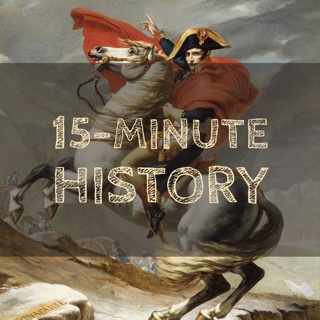
The American Civil War, Part 2 | War is Hell
Around him lay the carnage of battle, men killed or nursing wounds. Smoke filled the air and burned the colonel's lungs. His depleted regiment had already repelled three attacks by rebels charging up the hill and was nearing the end of their strength. And yet the grey-coats kept coming. His superior's orders rang in his ears, "You must hold the line." Looking around, he thought to himself, "What more can we do?" Then it came to him, an order not often given in these days of modern war. Standing tall, he gave instructions to his battalion and company commanders, and then shouted a single word to those men still standing—"Bayonets!" Join us as we teach you about the end of the American Civil War, the failings of Reconstruction, and the long-term effects of this conflict on our nation's history.
8 Maalis 202117min

The American Civil War, Part 2 | A Discussion on War is Hell
Join us as we discuss the end of the American Civil War, the failings of Reconstruction, and the long-term effects of this conflict on our nation's history.
8 Maalis 202138min

The American Civil War, Part 1 | War is Glory
The streets of Washington buzzed with the news. Now seven states had seceded from the Union, and the country stood on the brink. The White House saw streams of officials entering and leaving as the president summoned the Cabinet and members of Congress to find a solution to the country's plight. Most believed that his inaction the previous December had led to this moment, while others pointed to the results of the election as the breaking point. Regardless of who was to blame, something had to be done. Federal troops in Fort Sumter were in a precarious position and calling for aid. A ship had been dispatched to resupply them but could not land its cargo because of fire from rebel batteries. As he sat in his office on the second floor of the White House, the President of the United States knew that he could not reunite the country. His term would end at noon the following day. His successor, whose election had precipitated the great crisis of the Union, would now have to solve it. Join us in the first of a two-part episode where we teach you about the American Civil War and its effect on our history. Access this transcript at www.15minutehistorypodcast.org and please leave us a review wherever you listen to this podcast.
1 Maalis 202117min

The American Civil War, Part 1 | A Discussion on War is Glory
Join us as we discuss the beginnings of the American Civil War, the vile and evil institution of slavery, and the beginning of the bloody process by which it was finally brought to an end.
1 Maalis 202138min

Thomas Crapper | A Brief History of Plumbing
The concept of moving water from one place to the other has been on the minds of humans since their creation. Conversely, the desire to move soiled water away automatically has – at times – been considered equally important. The means by which this could be done has evolved as civilizations have come and gone. In all of them, a basic pattern emerged in plumbing conception and construction: the path, the pipe, and the seal. Join us as we teach you a brief history of plumbing, its evolution through the ages, and the influence of Thomas Crapper on plumbing technology and sanitation practices. Access this transcript at www.15minutehistorypodcast.org and please leave us a review wherever you listen to this podcast.
22 Helmi 202114min

Thomas Crapper | A Discussion on the Brief History of Plumbing
Join us as we discuss the history of plumbing, the influence of Thomas Crapper, and the legacy of the pipe, the path, and the seal.
22 Helmi 202117min

Romanticism | From Enlightenment to Emotion
It is very common throughout history to see periods of great innovation and artistic expression follow times of great turmoil and death. The Napoleonic Wars (1803-1815) were some of the worst years in the history of Europe, and in their wake, many artists, writers, philosophers, and common people took stock of what they had just endured. Join us as we teach you about the age of Romanticism and its effect on culture, art, and the sciences. Access this transcript at www.15minutehistorypodcast.org and please leave us a review wherever you listen to this podcast.
15 Helmi 202116min

Romanticism | A Discussion on Enlightenment to Emotion
Join us as we discuss the age of Romanticism and its effect on culture, art, and the sciences.
15 Helmi 202124min





















